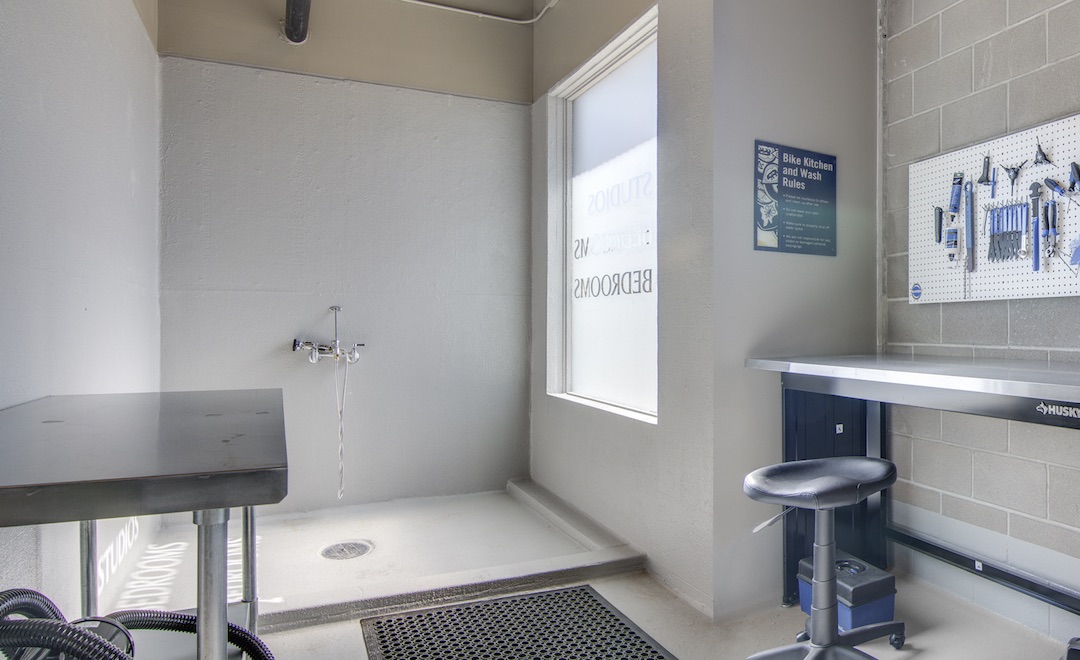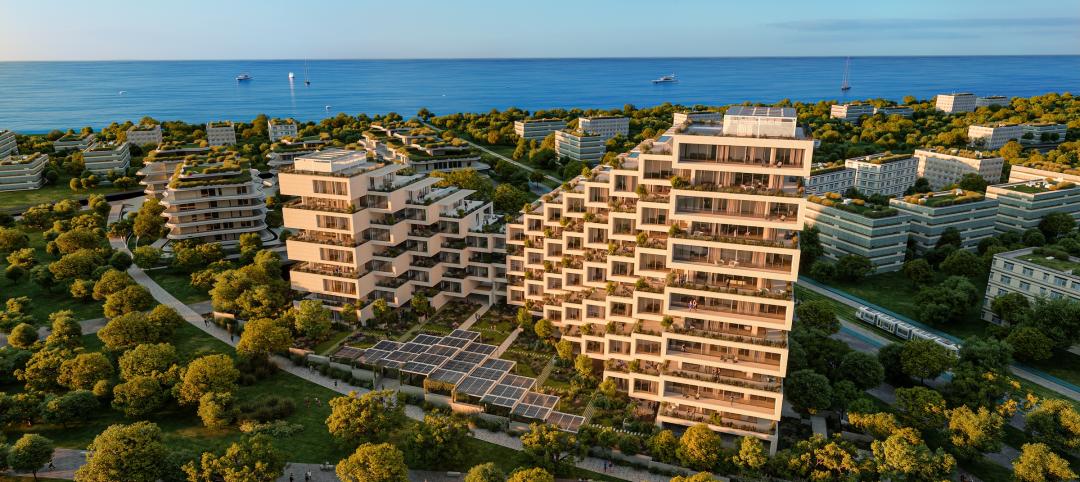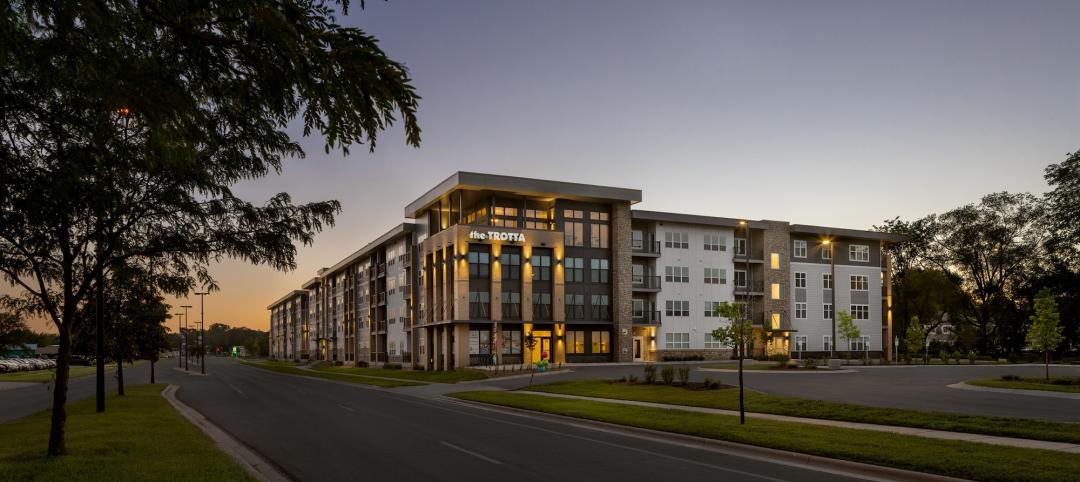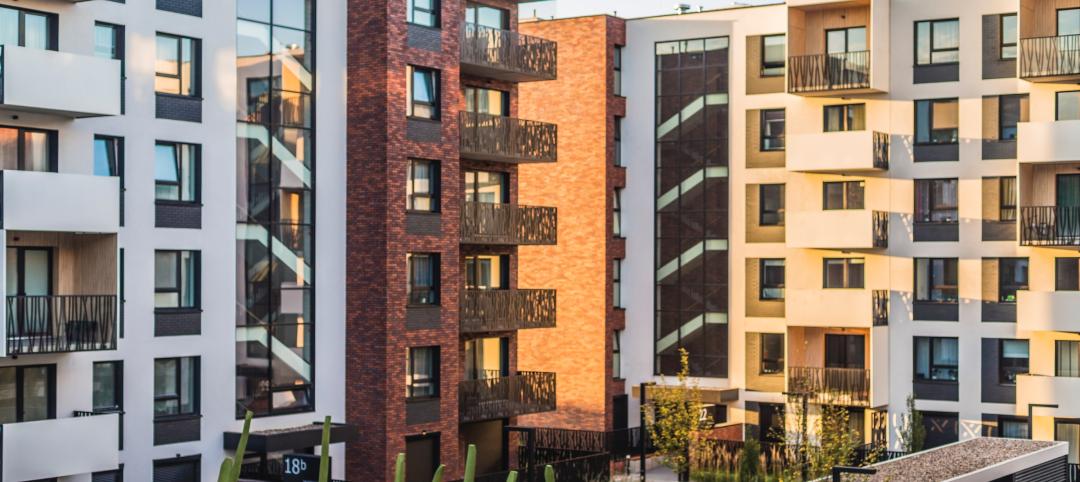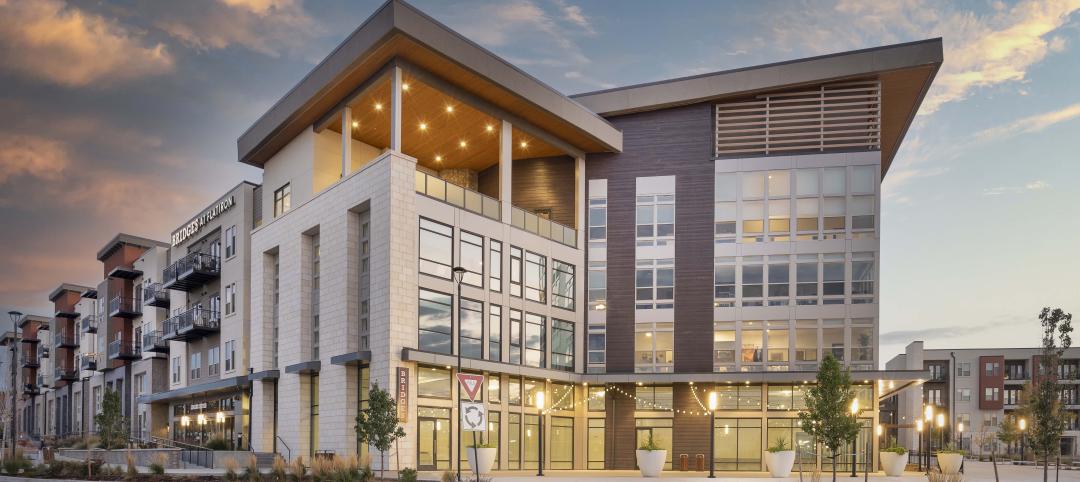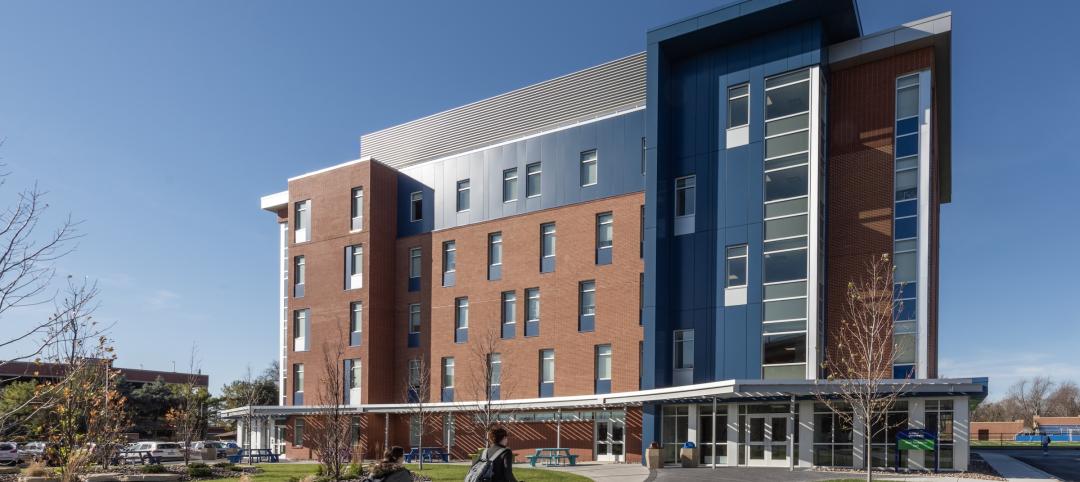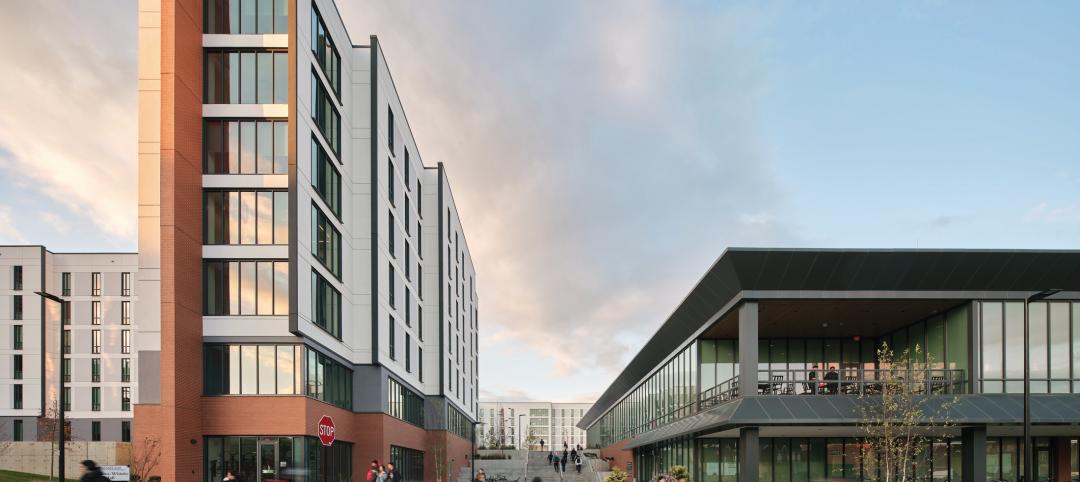Bicycling has become a preferred means of environmentally friendly, fun, and healthy transportation for millions of America’s apartment, condo, and townhouse dwellers.
From 2008 to 2017, bicycle ridership in the U.S. grew 40%, from 47 million to 66 million, according to Statistica.com. Couple the dramatic increase in cyclists with the fact that U.S. households are renting at higher rates than at any time in the past 50 years, and multifamily developers and their project teams are left with no choice but to include bicycle storage and maintenance high on their list of amenities.
In fact, this publication’s exclusive Multifamily Amenities 2017 survey found that two-thirds of respondents (66.5%) had included “secure bicycle storage” in recent projects.
“Every project we design has bike storage of some type, whether it is standard racks on the street, individual private lockers, or hundreds of bikes stored in a stacker configuration in the parking garage,” said Nathan Sciarra, AIA, Associate Principal, KTGY Architecture + Planning, Denver.
Bicycle amenity spaces can be divided into three distinct types: storage only (bike parking, storage racks); bike storage with workshop space (pumps, basic tools, wash area); and the latest variant, bicycle kitchens (more intensive workshop areas combined with an added social element).
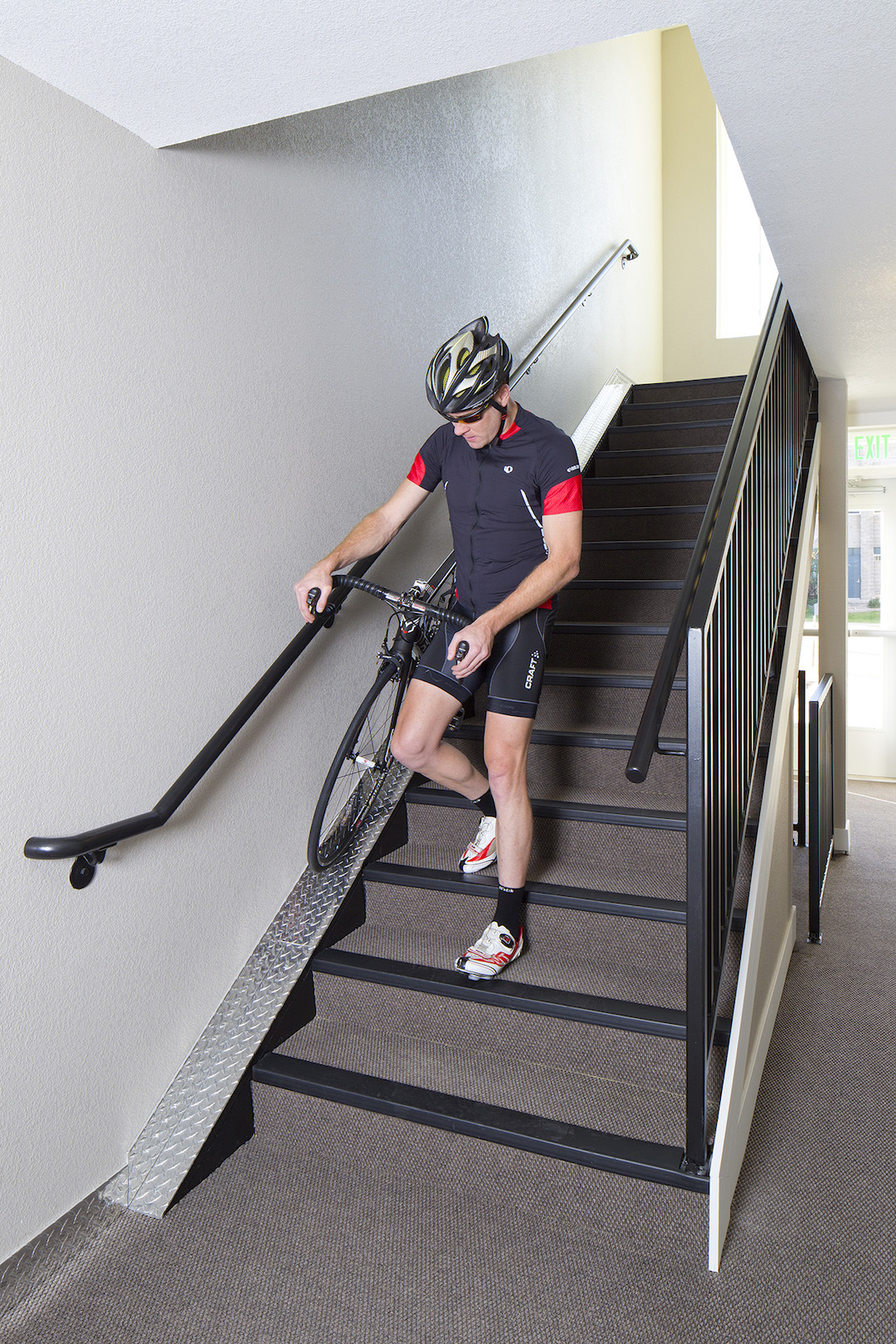 A metal ramp in a Boulder View (Colo.) community designed by KTGY Architecture + Planning runs along the edge of the stairs for easier shifting of bikes between floors. KTGY Architecture + Planning.
A metal ramp in a Boulder View (Colo.) community designed by KTGY Architecture + Planning runs along the edge of the stairs for easier shifting of bikes between floors. KTGY Architecture + Planning.
A bicycle kitchen is a luxury amenity that is very appealing to a growing group of multifamily dwellers. “I would describe them as bicycle clubhouses, where like-minded residents mingle, collaborate, share stories and adventures, and create connections,” said Bobby Long, Principal, Kephart. Considerable thought needs to go into the aesthetics and comfort of bicycle kitchens.
According to the design experts we consulted, there are certain features no bicycle kitchen should be without: large-screen TVs with cable service, WiFi, comfortable furniture that encourages gathering and relaxation, good lighting, and bicycle-themed artwork that brands the space. (One even has a sculpture made from bicycle parts.) No self-respecting cyclist wants to hang out in a poorly lit, uninviting, eldritch space reminiscent of the local auto shop.
See Also: Multifamily market trends 2018: Demographic shifts reshape the residential landscape
Storage and workshop aspects cannot be ignored. Space for tools and repair equipment, storage racks with ample clearance for loading and unloading onto cars, accessory storage for helmets and bags, and an area for washing bikes must be accounted for.
Creating the perfect bicycle kitchen is all about finding the ideal balance between a workshop and a social space, said Jimmy Sinis, Senior Design Manager and Senior Associate, Stantec.
“Spaces like this foster a sense of community among residents,” said KTGY’s Sciarra. “To be considered a full bicycle kitchen, the design must incorporate comfortable seating, entertainment opportunities, and more. Then it’s more a kitchen than a repair space.”
Not every multifamily project needs a full bicycle kitchen, but bicycle storage of some kind has become a necessity for most new apartment and condo enterprises.
Using racks that stack bikes vertically saves space and enables more residents of Brooklyn’s Caesura mixed-use building, designed by Dattner Architects, to securely store their bicycles. Dattner Architects.
RATIOS, RATIOS, IT’S ALL ABOUT THE RATIOS
Then there are those pesky zoning requirements and resident-to-space ratios to consider. Having too little—or even too much—room can impair the functionality of bicycle storage areas.
In some jurisdictions, local zoning law dictates the required ratio of bike storage spaces to apartment units. Washington, D.C., requires one bike parking space for every three residential units (the same as LEED). Some designers feel that’s not enough bike storage space to meet residents’ expectations.
According to Sciarra, the ideal ratio depends a lot on where the project is located. In urban areas with easy access to stores, restaurants, and entertainment venues, one bicycle space for every two units should work. (According to Ira Mitchneck, AIA, Senior Associate, New York–based Dattner Architects has found this ratio to work just fine in its projects, which are primarily in dense urban areas.) In suburban locations where more residents probably have a car, the ratio can be lowered to one storage space for every four or five units, said Sciarra.
Determining the best ratio of bike storage spaces to automobile parking spaces is more complicated. Miami’s zoning code, known as Miami 21, is a form-based system that relies on New Urbanism and Smart Buildings principles. It requires one bike storage space for every 20 parking spaces. Other jurisdictions allow for fewer vehicle parking spaces as the number of bike storage spaces increases.
“We don’t believe the correlation is that simple,” Sciarra said. “In our experience, the number of parking spaces and bike storage is driven more by location and the bike culture of that location.”
Kephart’s Long agrees. “I don’t think we’re looking at any specific ratios,” he said. “Each project is so specific, based on adjacency to bike lanes and paths and the specific bike culture.” Meaning whether—and how much—residents use their bikes for commuting, shopping, recreation, and physical training. “It’s certainly not a one-size-fits-all approach,” said Long.
Related Stories
MFPRO+ News | Jan 8, 2024
Canada turns to 1940s strategy to speed up housing construction
To address a severe housing shortage, Prime Minister Justin Trudeau’s administration has begun a housing construction strategy pioneered in the years after World War 2. The government aims to use a catalog of pre-approved home designs to reduce the cost and time to construct homes.
MFPRO+ News | Jan 4, 2024
Bjarke Ingels's curved residential high-rise will anchor a massive urban regeneration project in Greece
In Athens, Greece, Lamda Development has launched Little Athens, the newest residential neighborhood at the Ellinikon, a multiuse development billed as a smart city. Bjarke Ingels Group's 50-meter Park Rise building will serve as Little Athens’ centerpiece.
MFPRO+ News | Jan 2, 2024
New York City will slash regulations on housing projects
New York City Mayor Eric Adams is expected to cut red tape to make it easier and less costly to build housing projects in the city. Adams would exempt projects with fewer than 175 units in low-density residential areas and those with fewer than 250 units in commercial, manufacturing, and medium- and high-density residential areas from environmental review.
MFPRO+ News | Dec 22, 2023
Document offers guidance on heat pump deployment for multifamily housing
ICAST (International Center for Appropriate and Sustainable Technology) has released a resource guide to help multifamily owners and managers, policymakers, utilities, energy efficiency program implementers, and others advance the deployment of VHE heat pump HVAC and water heaters in multifamily housing.
Giants 400 | Dec 20, 2023
Top 100 Apartment and Condominium Construction Firms for 2023
Clark Group, Suffolk Construction, Summit Contracting Group, and McShane Companies top BD+C's ranking of the nation's largest apartment building and condominium general contractors and construction management (CM) firms for 2023, as reported in Building Design+Construction's 2023 Giants 400 Report.
Giants 400 | Dec 20, 2023
Top 70 Apartment and Condominium Engineering Firms for 2023
Kimley-Horn, WSP, Tetra Tech, and Thornton Tomasetti head BD+C's ranking of the nation's largest apartment building and condominium engineering and engineering/architecture (EA) firms for 2023, as reported in Building Design+Construction's 2023 Giants 400 Report.
Giants 400 | Dec 20, 2023
Top 160 Apartment and Condominium Architecture Firms for 2023
Gensler, Humphreys and Partners, Solomon Cordwell Buenz, and AO top BD+C's ranking of the nation's largest apartment building and condominium architecture and architecture/engineering (AE) firms for 2023, as reported in Building Design+Construction's 2023 Giants 400 Report.
Giants 400 | Dec 20, 2023
Top 40 Student Housing Construction Firms for 2023
Findorff, Juneau Construction, JE Dunn Construction, and Weitz Company top BD+C's ranking of the nation's largest student housing facility general contractors and construction management (CM) firms for 2023, as reported in Building Design+Construction's 2023 Giants 400 Report.
Giants 400 | Dec 20, 2023
Top 30 Student Housing Engineering Firms for 2023
Kimley-Horn, Wiss, Janney, Elstner Associates, KPFF Consulting Engineers, and Olsson head BD+C's ranking of the nation's largest student housing facility engineering and engineering/architecture (EA) firms for 2023, as reported in Building Design+Construction's 2023 Giants 400 Report.
Giants 400 | Dec 20, 2023
Top 90 Student Housing Architecture Firms for 2023
Niles Bolton Associates, Solomon Cordwell Buenz, BKV Group, and Humphreys and Partners Architects top BD+C's ranking of the nation's largest student housing facility architecture and architecture/engineering (AE) firms for 2023, as reported in Building Design+Construction's 2023 Giants 400 Report.


